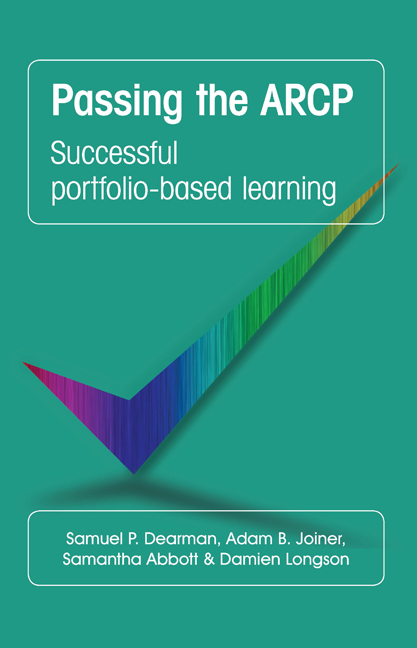Book contents
- Frontmatter
- Contents
- Authors
- List of figures
- Foreword
- Preface
- Acknowledgements
- List of abbreviations
- How to use this guide
- 1 Quick reference guide
- 2 What is a portfolio?
- 3 Lessons learned so far
- 4 Organising the portfolio
- 5 Managing your workplace-based assessments
- 6 Reflective practice and self-appraisal of learning
- 7 Audit and research
- 8 Teaching
- 9 Psychotherapy experience
- 10 Management and leadership experience
- 11 Appraisal reports, planning meetings and educational objectives
- 12 Other experiences, achievements and documents
- 13 The future of portfolios
- Index
How to use this guide
- Frontmatter
- Contents
- Authors
- List of figures
- Foreword
- Preface
- Acknowledgements
- List of abbreviations
- How to use this guide
- 1 Quick reference guide
- 2 What is a portfolio?
- 3 Lessons learned so far
- 4 Organising the portfolio
- 5 Managing your workplace-based assessments
- 6 Reflective practice and self-appraisal of learning
- 7 Audit and research
- 8 Teaching
- 9 Psychotherapy experience
- 10 Management and leadership experience
- 11 Appraisal reports, planning meetings and educational objectives
- 12 Other experiences, achievements and documents
- 13 The future of portfolios
- Index
Summary
This book is a guide and not a set of rules – there will be alternative approaches to organising and populating a portfolio. Across the UK different programmes will use different portfolios, in paper or electronic versions, allowing varying amounts of freedom in terms of structure and presentation. Throughout this book there are repeated references to planning, assessment, reflective practice, development and evidence. This is intentional, reminding the reader of the guiding principles underlying the successful negotiation of the ARCP. There is an emphasis on using the portfolio as a tool that catalogues evidence and drives learning, and because the portfolio will change and improve over time, some educationalists refer to it as a living document. However, it is equally important that the portfolio is readable and well structured.
The first chapters of this book provide the reader with an insight into the background of the present approach to psychiatric training and how the portfolio fits into this. Included are lessons learned following the first years of specialty training and the ARCP process, which includes perspectives from training, administration and the ARCP panel. The book then looks at the individual sections of the psychiatric training portfolio in some detail. Each chapter, as far as possible, aims to follow the same structure such that trainees can translate its content into a method of using the portfolio to communicate evidence of competence effectively. Chapters begin with basic principles, often followed by bullet points in the form of prompts or questions. The methods suggested are then applied to specific examples, where possible comparing good and less successful practice. Because there is no ‘right’ way to produce the portfolio, the hope is to illustrate the issues early in each chapter by use of examples and not simply to spoon-feed directives. Trainees can apply the basic principles and prompts to see why the examples are informative, or uninformative, and then use this as a framework to structure their own work.
If this book helps trainees develop a conceptual framework as to how to plan their learning according to curriculum competencies and structure their portfolio to follow training, making each section logical and informative, then it has achieved its goal.
- Type
- Chapter
- Information
- Passing the ARCPSuccessful Portfolio-Based Learning, pp. xiii - xivPublisher: Royal College of PsychiatristsFirst published in: 2017



